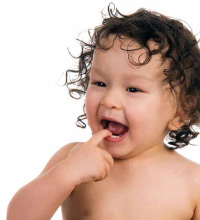Oral hygiene is one of the basic components of your child’s lifelong dental health. Poor oral hygiene may cause your child infection, pain and discomfort, eating difficulties and speech problems. You play a key role in establishing habits of proper dental care routine in the early years of your child’s life to avoid oral health problems.
Read the answers to the most common questions parents have about children’s oral care:
What is the best way to brush your child’s teeth?
For infants, you can gently wipe the gum with a soft cloth or gauze and water even before the first tooth erupts. This habit will clean the gum surface and sooth your baby’s teething pain. Once the first tooth emerges, wipe it with a small, wet cloth to remove food particles. By the time your child has additional teeth, you can help to brush her teeth by using a soft children’s toothbrush and water. It is advisable not to use toothpaste for children below two as they are not capable of spitting it out after brushing.
It is recommended to brush twice a day (morning and before bedtime) by gently brushing the inside surfaces, the outside surfaces, chewing surfaces, as well as the tongue. Additionally, flossing can be done right after brushing to remove food particles from between the teeth. However, remember to consult your child’s dentist on proper flossing techniques.
When can you allow your child to brush his or her own teeth?
The best age for children to start learning how to brush their own teeth is around two or three years old. Let your child try brushing his or her own teeth when he or she is ready. It is recommended that you brush together to let your child master the technique by observing you. To ensure that your child is learning the correct techniques, schedule a dental check-up for professional lesson on oral care.
What are the common problems faced during child oral care by parents?
Early childhood caries is usually caused by injudicious use of milk in the feeding bottle or demand feeding. Its early stage is not easily noticeable as it typically appears around the neck of upper front teeth, and looks like a whitish/yellowish discoloration; it can be dismissed as milk remnants or food debris.
Since young children lack the dexterity to remove the plaque at this area, you should use the “Lift the Lip” approach to check on occasion. By lifting your child’s lips, you can see whether or not the debris and milk remnants have been brushed away, or even detect the whitish/yellowish spots.
Are pacifiers and thumb sucking habits harmful for your child’s teeth?
The use of pacifiers and the habit of sucking on the thumb or finger can cause problems with the growth of the mouth and jaw in the long term. These habits can affect the alignment of the top and bottom teeth (the “open bite”) and the shape of the mouth and position of teeth.
The use of pacifier is best to be dropped by the age two. Get a professional evaluation if your older child is having problems letting go of the habit.
What can you do to encourage your child to brush/floss?
Use some creativity to make it more fun. Let your child choose his or her own toothbrush and toothpaste. You can create a tooth brushing song or make this habit a family activity by brushing together every day in the morning or before going to bed.
Are certain foods or habits more likely to cause tooth decay?
Putting your child down for a nap with a bottle of juice or milk or letting your child walk around all day with fruit juices or sugary drinks from a “sippy” cup are more likely to cause tooth decay.
Sugary drinks and sweet, starchy or sticky foods will cling to your child’s teeth and provide food for bacteria that live in the mouth. The bacteria produce acids that can trigger tooth decay. If left unchecked, dental disease can adversely affect a child’s growth and learning, and can even affect speech. Hence, sugary drinks (including fresh juices) and starchy foods should be limited to mealtimes only.
Will certain medications increase your child’s risk of developing tooth decay?
Some medications for chronic diseases, like those for asthma, may contribute to the decay of children’s teeth. This is largely due to the presence of sucrose (sugar) that is used as the base to make the medicine more palatable. Antibiotics and some asthma medications can cause an overgrowth of Candida (yeast) which can lead to oral thrush (fungal infection). Consult your child’s dentist on proper dental care routines if your child is on chronic disease medications.
When should you take your child to the dentist for his/her first check-up?
See a dentist once your child’s first tooth appears or no later than his or her first birthday. Follow your dentist’s advice for follow-up visits and proper dental care techniques.






Comments